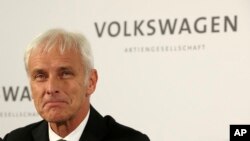U.S. environmental officials said Wednesday that talks would continue with Volkswagen aimed at reaching an agreement on a fix for nearly 600,000 diesel vehicles that emit up to 40 times the legally allowable limits.
Nearly four months after the emissions scandal broke, there is no timetable for winning approval of a fix — or for starting to repair vehicles or lifting the government's ban on the sale of 2016 VW diesel models.
VW Chief Executive Officer Matthias Mueller met with Environmental Protection Agency Administrator Gina McCarthy for an hour at the agency's headquarters Wednesday. It was the highest-level meeting between U.S. and VW officials since the scandal became public in September.
"We will continue to work toward a solution," an EPA spokeswoman said.
The company has faced growing criticism of the handling of the problem, and some U.S. government officials were angered by a radio interview in which Mueller suggested that VW officials did not lie to hide the emissions software.
Mueller said earlier this week that he planned to propose a fix at the meeting, which the German automaker had requested. Neither VW nor the EPA would answer questions about whether the proposal was made or how it might have been received.
California rejection
The meeting, which also included Herbert Diess, head of the company's VW brand, came one day after California rejected VW's plan submitted in December as "inadequate" and not fast enough — and EPA agreed.
Mueller left the agency headquarters without making any comments. "We appreciate the time that Administrator McCarthy took to meet with us," the company said in a statement. "Volkswagen will continue to fully cooperate."
In Detroit, Chris Grundler, who heads the EPA's Office of Transportation and Air Quality, said at an Automotive News forum that the agency wanted a fix as soon as possible — and that the agency does not have a satisfactory plan yet from VW.
"We are in a hurry," he said, but he offered no timetable for approving one, or details on why VW's initial proposal fell short.
He said regulators would continue to "insist on an expeditious fix that will not only bring these vehicles into compliance but also do so in a way that doesn't create any adverse impacts for owners," Grundler said.
New catalytic converter
On his first U.S. visit since the emissions scandal erupted in September, Mueller has been meeting with government officials in Washington since late Monday.
Mueller said Sunday that he believed a new catalytic converter system could be fitted to most affected U.S. vehicles in a solution he believed might satisfy regulators.
However, he also appeared to play down the seriousness of the cheating by Europe's biggest carmaker during an interview aired by National Public Radio.
Mueller blamed the scandal on a misunderstanding and called it a technical, not an ethical, problem.
The remarks, coupled with the time it has taken Mueller to visit the United States since becoming CEO in September, drew criticism in the United States and raised fresh questions about Volkswagen's handling of the crisis.
'Anything but helpful'
A union source close to the German company's supervisory board said Wednesday that he was "astonished" by Mueller's remarks.
"Those comments are anything but helpful and should have never been made," he said, speaking on condition of anonymity because of the delicacy of the subject.
Volkswagen in Wolfsburg later issued a statement acknowledging the "irritation" caused by Mueller's choice of words in English, which is not his native language.
"It is important for him to make clear: Volkswagen's apology for the breach of trust with the American people is meant sincerely and honestly," the company said.
Barclays analysts said obtaining the good will of U.S. authorities could be crucial in reducing civil or criminal penalties the carmaker is likely to face.
Shares of VW, down about a fifth since it admitted cheating the tests, rose by as much as 3.4 percent Wednesday on hopes of a deal but closed down 0.4 percent at 120.50 euros.





